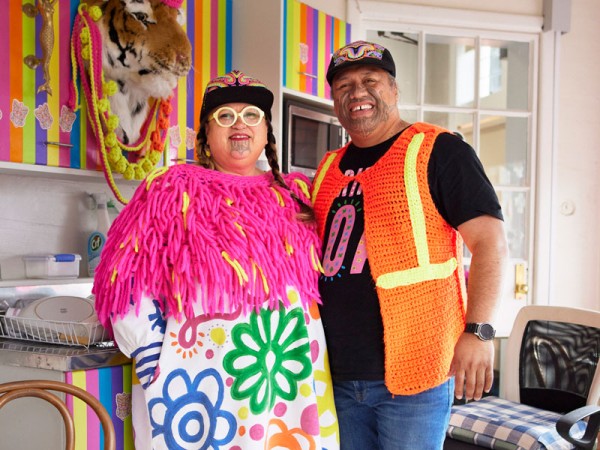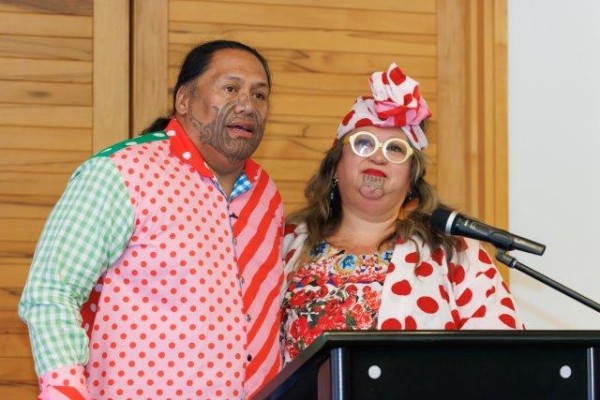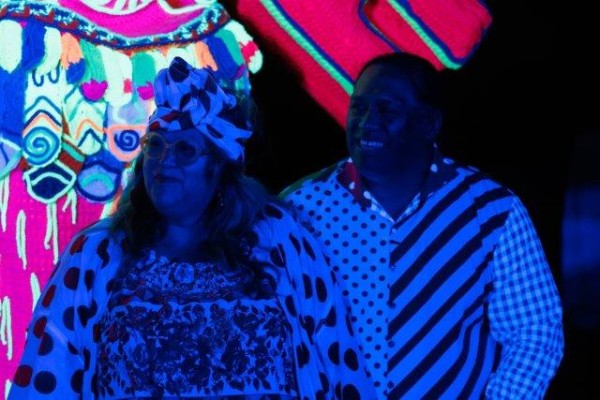Interview: Lissy and Rudi Robinson-Cole, creators of Wharenui Harikoa
7 March 2024

Lissy Robinson-Cole and Rudi Robinson-Cole in their studio. Photographer: Ralph Brown.
A heart-to-heart conversation with Lissy and Rudi about their 'haerenga ki harikoa' (journey to joy), creative partnership, and what you learn when you're teaching.
This interview is edited and condensed from a conversation with curator Maree Mills in December 2023.

Lissy and Rudi's wedding in 2017.
MM: This 'house of joy' is also a house of love manifested by you and your husband Rudi. How did you two meet?
Lissy: I was working in the health sector, my colleague came into the office with a big bag of flour and dumps it on my desk. I said "What’s that for?", he goes: "That’s from Rudi (his flatmate). Rudi didn’t want to give you flowers, he wanted to give you flour!” (I’d been going on about how I make the best fried bread haha.)
I was like, How RUDE! The NERVE of it!! but I secretly liked it… and I do make the best fried bread… So my first date was going around to their place and Rudi was going to cook for me. It was such a very lovely evening and of course I made the fried bread… and the rest is history!
I had a huge love for the place I worked back then. My counsellor had given me a birthday card which said DON’T FORGET YOUR DREAMS and I had stuck it on my computer. I would look at it and it would gnaw away at me. I was so terrified of course.
But I knew my soul's purpose was creativity… I just knew it! And I wanted it. But I didn’t know how to do it. I knew I was gifted - I have always been able to do 50 million things creatively - but making money wasn’t one of them. I just didn’t know how I was going to sustain myself.
The mother of all invention is necessity and you get an energy about you. I met the local board arts advisor (in South Auckland) and she gave me a grant of $2,000 to yarn bomb. After having nothing for a whole year, it was a miracle. Then I applied for Creative Community funding and that’s how I started doing our workshops, in our local library.
In the meantime Rudi and I had set out an intention of creating together! I remember we were organising our wedding and it was so JOYFUL and so much fun. I stopped and said, "we have to send this feeling up into the Universe! It's all about the feeling - This is how you manifest - I just know it!" So we sat on our porch and we held hands and said our simple karakia: This is how we want to live our lives - please make a way for us to work together, creatively, full time, and sustain ourselves financially.

Lissy and Rudi's 2019 project, The Joyride.
MM: Then, the Covid-19 lockdown was an enabler?
Rudi left his job, he was teaching at a welding and fabrication school, but they pretended everything should carry on as ‘normal’ so he made a stand. Of course I panicked. How are we going to pay our rent? But he made up his mind.
When the vision came of this wharenui of joy, of love, we talked a lot about how it might manifest. You know… are we going to work with people around the motu to create a 'nga hou e wha' (the four winds) type whare, what will it be?
At that stage I think Rudi was reading Dr Rangi's (Mātāmua) book, Matariki: The Star of the Year. I remember we were sitting at the kitchen table and he said, "Ya know I think the design for this whare should be Matariki based" and I thought OF COURSE! It was right before it was announced Matariki was going to be a public holiday.
I thought yes, Matariki was a time to SLOW down, come together, it’s the coldest time of the year too. As soon as Rudi said it… it was wow, that makes sense, this is what we are doing. Straight away we had a waananga with our whaanau and with our nephew who was one of our tikanga advisors. There are heaps of artists in our whaanau too.
However Rudi is our knowledge holder. I am way too busy in my head in a dream land most of the time to retain details. In terms of the maatauranga and the factual stuff, that’s Rudi's job, he holds all of that. We have our very distinctive roles. He is the nuts-and-bolts practical person and he reads books, while I'm still busy making.
Well, you know… then we got declined funding from Creative New Zealand. I will never forget it! Previously I had heard this overwhelming voice from our tuupuna saying "this wharenui is going to happen, you are going to do it! And the whole thing will be funded". I was like "OK!" and then when we got declined I was so shocked!
They questioned where we were getting our rangahau from and we were getting it from EVERYWHERE - on all levels and at the right time, we met the right person, have a dream, if you know what I mean? For Rudi and I, it has been an incredibly natural journey. With CNZ saying NO, we accepted that our tuupuna were saying "guys, you need to go deeper, and you need to get more support”.

Custom-dyed wool made by Outlaw Yarn, Christchurch.
That’s when we had the waananga at home. We invited Nigel (Borell) who supported us from the beginning. He was loving what we were doing. Hollie (Tawhiao), Jack (Gray), Hamiora (Bailey)... Dr Rangi came for a cuppa and ended up staying. His koorero blew us all away... Rudi's mate Kutz, a master carver and he did his mataora... Who else came? Margy (Aull) popped in, Zoe Black, Ron Te Kawa, Tim (Melville) also stopped by, so all of these people then became like our pool, a beautiful foundation for us.
Rudi: That waananga really changed our trajectory. You know we had our kids there, our mokos from Australia, they were there listening to the koorero - they were inspired, listening and were part of it.
Lissy: Especially Dr Rangi's koorero, he said “you don’t need anyone to validate this, I support this kaupapa one hundred percent" and he said "your intent is pono and that is all that matters”.
Challenging us helped us evolve, we could see the transformative power of just the physical act of crocheting. But when the wharenui vision came, we knew it could have a global impact of aroha. The feeling or sense was that when you came in to the wharenui it would feel like Nanny's embrace under a blankie. The deep connection we have to our nanas - still - even though she has been gone since I was six, we know the transformative powers of aroha, of love, even in that most simplest way. We knew the wharenui would have this power to heal simply though the act of the safe embrace.
Rudi: Zoe said she had a week between open exhibitions (at Objectspace) and asked if we wanted to put up the wharenui. So we were able to get some scaffolding in and put everything up where we thought it would go. We knew then it needed to be longer, you know. It allowed us to see everything up.

Wharenui Harikoa under construction, May 2022. Photographer: Sam Hartnett.
MM: It must have been a decision point - did you realise you might need a lot more money?
Lissy: Yes, but by then we had already received the Ministry of Culture and Heritage money (through Te Urungi Innovation Fund) and that was one of the reasons we did a ‘buy a ball’ campaign to help fund that bigger section. We could also pay our rent, put food on the table - Aaahmazing!
Rudi: I also knew the power of this practice from crochet workshops that we were doing in the prisons in 2019. I took my wheku and they were like "who is this guy?". When they came in to do the workshop a barrier had been broken because nostalgically they could feel their nannies. They could feel their aunties, their mamas. We could talk more easily, we had karakia.
I taught them how to crochet, we were talking about where they come from, you know, whakawhaanaungatanga, they felt safe - that’s the healing! The workshops usually run for 45 minutes but they left me with these guys for two hours! The prison guards kept on going past and looking in because all these guys were quiet, concentrating. They come in and go "Matua, you fullas gotta have lunch!"
But you know, I had come from a background of teaching trades. Naturally being able to connect through that. I would say "loosen up, breathe". You can tell what’s happening with a person by their work.

Rudi Robinson-Cole with crochet wheku sculpture. Photographer: Hohua.
MM: You have seen the healing power of the process - outside the context of Wharenui!
Lissy: This one woman came up (during a workshop) and said "I want you to know how healing this is for me. When I was eight, my mum tried to teach me crochet but I couldn’t get it and my mum was angry, it caused all these roll-on effects in my life. Just to have one person be patient enough to teach me - it has had a flow-on effect in my life. I want you to know that you are not JUST teaching people how to crochet!"
Rudi: I get people coming up to me all the time, "hey You are Rudi, my daughter follows you on Instagram and she loves your work, she has pets and she crochet little bonnets for her cats her chickens" LOL and it's totally amazing, and it's hard case. She goes "Thank you, this has given my daughter back to me. She could be on social media and all that, but this has given her back to us!"
We don’t know the ripple effects of the mahi that we do so I really appreciate it when we find out.
MM: What on earth are you going to do after this...?
Rudi: I see us working with other indigenous groups, to actually start adding to the wharenui. Because the kaupapa is around Matariki and how we as indigenous peoples observe this, come together and celebrate it, That has an amazing scope for us - we can host different waananga, bring it back into the wharenui.
Lissy: Oh yeah, right around the world, the whole planet looks up to the stars!
Rudi: You know we have already started that with our collaborations. We have really started having those conversations. I see us becoming more global and adding to the wharenui - and, yes, it could change, it’s a living wharenui.
Lissy: Rudi and I are collaborators and we collaborate with our tuupuna. We are also having collaboration with our higher selves, the absolute, the real Lissy Cole. There are all these collaborations in this realm and in the others. We love to work with others. We are really so open, also we have a karakia asking for the right people to come .
London Kaye was the first international person I wanted to ask. She inspired me right from the get-go to yarn bomb. I first came across her work in 2017. I said "ONE day we are going to do something together", I was adamant.
During the lockdown she went on to this platform called Twitch where she was in her apartment just crocheting and you could ask questions live. I text her "OMG I love you, I love your work. We are in Aotearoa New Zealand, this is what my husband and I are doing, can I send you some photos" and I sent her images of the first two pou, Hiwa-i-te-Rangi and Poohutukawa. She was amazed, she said "I don’t even know how you go 3D!" I think she appreciated that we were so inspired by her but then had gone our own way. When I asked her if she wanted to do something, she was "yep" straight away. Aaahmazing!
And then our Icelandic crocheter, Tinna Thorvaldar, I just really love what she was doing so I just reached out and asked, and she said yes.
Our New York based Puerto Rican artist, Carmen Paulino, she contacted us, she wanted to interview us on her Instagram page. She was like "Our community look up to you and Rudi - husband and wife team - I’d love to interview you". After that I said "Umm do you want to be part of Wharenui?" and she was "YEP!".
The last one was Francoise Danoy, Maaori living in Texas. When we asked her she was "100% yes". The international co-labs have just come thick and fast.

Contributing artist Hollie Tawhiao working on the pou 'Waitii' in July 2022.
MM: Going forwards, how will you sustain this project and your artistic practice?
Rudi: Sometimes I feel the need to be a bit of a recluse. I get up in the night and I am staring up at the stars… and I have no idea what’s going on down here because you know, I’m just there with nature - I have no idea about that social media world.
Lissy: But I do… I see what’s going on but I cannot engage with it, agendas being pushed with fearmongering, with “media”. So we just stay focused and stay with our knowing, what we have to do for our own whaanau, moko, hapuu, iwi, world! Why on earth wouldn’t you want to do something that’s based on love. Love has a resonance!
The bread and butter ‘thing’ is still to make itself known to us but we are envisioning and I want to create intergenerational wealth for us and our whaanau.
We could set up a little kura and start teaching our nephews, you know that’s what I am seeing with our multi-storied building that we now need. I had a chat with Foundation North community trust and they fund buildings and we fit with their funding requirements and I am already seeing a round white wharenui, that could be the next one.
All the dreams are HUGE - why wouldn’t you dream huge? It's when they come true, it's like "whoa, now I have to live the dream LOL!"


Lissy Robinson-Cole and Rudi Robinson-Cole at the opening of Wharenui Harikoa at Waikato Museum, December 2023.
Wharenui Harikoa exhibition
Wharenui Harikoa
Open 1 December 2023 to 17 March 2024
Free entry
Waikato Museum Te Whare Taonga O Waikato
Ngaa kupu | Glossary
For further assistance with te reo Maaori, visit Te Aka Māori Dictionary.
aroha |
love |
hapuu / hapū |
sub-tribe |
Hiwa-i-te-Rangi |
deity from the Matariki star cluster |
iwi |
tribe |
karakia |
prayer |
kaupapa |
foundational purpose |
koorero / kōrero |
conversation |
kura |
school |
maatauranga / mātauranga |
knowledge |
mahi |
work |
mataora |
facial tattoo |
Matariki |
star cluster whose appearance in the night sky signifies the Maaori New Year |
matua |
male elder (father, uncle) |
moko (mokopuna) |
grandchildren |
motu |
country, nation |
pono |
true |
Poohutukawa / Pōhutukawa |
deity from the Matariki star cluster |
pou |
pillar |
rangahau |
research |
tikanga |
customs |
tuupuna / tūpuna |
ancestors |
waananga / wānanga |
meeting |
whaanau / whānau |
family |
whakawhaanaungatanga /whakawhānaungatanga |
getting to know each other |
wharenui |
meeting house |
wheku |
carved face |
Please note
For te reo Maaori, Waikato Museum uses double vowels (uu) in place of vowels with a macron (ū) to represent a long vowel sound. This spelling approach is the preference of tangata whenua in Hamilton Kirikiriroa and Waikato iwi for te reo Maaori words.
